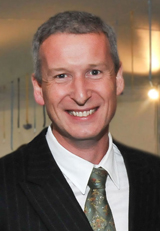Einstein's Children Evaluation and Rehabilitation
Einstein's Children Evaluation and Rehabilitation Center Names First Research Director
December 7, 2009 — (BRONX, NY) —John J. Foxe, Ph.D., a leading neuroscientist, has been named the first research director of the Children's Evaluation and Rehabilitation Center (CERC) at Albert Einstein College of Medicine of Yeshiva University. Dr. Foxe, who also will serve as professor of pediatrics and of neuroscience at Einstein, will assume the newly created position January 1, 2010.

John J. Foxe, Ph.D.One of the largest centers of its kind in the United States, CERC staff members evaluate, diagnose, and treat children and adolescents who have developmental disorders such as autism, attention-deficit hyperactivity disorder (ADHD), cerebral palsy, and hearing impairments. Dr. Foxe will focus particular attention on childhood schizophrenia and autism.
"John Foxe is a brilliant researcher who embraces CERC's mission to help children with disabilities reach their full potential and provides support to their families," says Robert Marion, M.D., director of CERC and the Ruth L. Gottesman Chair in Developmental Pediatrics. "His intelligence and dedication will bring the knowledge and direction we need to bolster our clinical research efforts and extend our impact."
Dr. Foxe earned his Ph.D. degree in neuroscience from Einstein. He returns to the College of Medicine from the City College of the City University of New York, where he directed the Ph.D. program in cognitive neuroscience and co-directed its Children's Research Unit. He will continue in his role as director of the Cognitive Neurophysiology Laboratory at the Nathan S. Kline Institute for Psychiatric Research in Orangeburg, New York.
"John Foxe is a brilliant researcher who embraces CERC's mission to help children with disabilities reach their full potential and provides support to their families."
-- Robert Marion, M.D., Director of CERC and the Ruth L. Gottesman Chair in Developmental Pediatrics"There's a tremendous groundswell of interest in research among the clinical staff I've met at CERC," says Dr. Foxe. "I'd like to see us make a real impact with research that leads to new treatments and interventions for children with developmental disabilities."
Dr. Foxe plans to recruit new faculty who specialize in developmental disorders, increase collaborative studies between CERC physicians and the scientists in other Einstein departments, and enroll more CERC patients in clinical studies. He also will bring many of his own research projects and grants, as well as about 25 members of his team from the Children's Research Unit.
Dr. Foxe's research partner, Sophie Molholm, Ph.D., joins him at CERC and will serve as associate professor of pediatrics and of neuroscience at Einstein. She was an associate professor of psychology and of cognitive neuroscience, and the director of the Children's Research Unit at the City College of the City University of New York. Dr. Molholm also is a research scientist at the Cognitive Neurophysiology Laboratory at the Nathan S. Kline Institute for Psychiatric Research.
Together, Drs. Foxe and Molholm were recently awarded a five-year, $2.8 million grant from the National Institutes of Health to study whether multisensory integration (the brain's processing of information from different senses) is impaired in people with autism. This research will continue at CERC and could have important implications for improving the quality of life of children with autism.
CERC's professional staff provides over 50,000 diagnostic, therapeutic and related services to approximately 7,000 children and adults annually, while training more than 1,000 professionals each year. CERC is a major component of the Rose F. Kennedy University Center for Excellence in Developmental Disabilities, one of 67 designated regional centers that are federally funded to conduct interdisciplinary training, provide clinical services, furnish technical assistance, carry out research in the field of mental retardation and developmental disabilities, and create a bridge between universities and the community through various outreach and dissemination activities, and by direct consumer involvement.
Other Top Stories
9/11 World Trade Center Exposure Linked to Heart Disease Among NYC Firefighters
On Becoming a Physician: New Einstein Students Receive White Coats and Stethoscopes
Novel Therapy for Acute Migraine Shows Promise in Phase 3 Clinical Trial
First Complete Wiring Diagram of an Animal's Nervous System
Multimillion Dollar NIH Grant to Help Reduce Opioid Use & Get Care to People Who Need It
NIH Grant Funds $23 Million Study of Diseases Affecting People Living with HIV
New TAILORx Data Guides Adjuvant Therapy in Younger Breast Cancer Patients
Einstein Celebrates Its 61st Commencement
Bolstering Biopsies: Testing Patients' Individual Cells to Guide Treatment



Tablet Blog